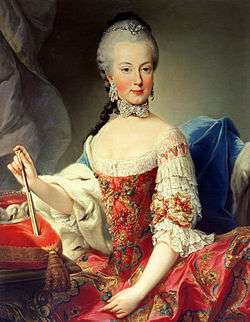Le feste d'Apollo
| Christoph Willibald Gluck |
|---|
 |
|
Operas
|
Le feste d'Apollo (The Festivals of Apollo) is an operatic work by Christoph Willibald von Gluck, first performed at the Teatrino della Corte, Parma, Italy, on 24 August 1769 for the wedding celebrations of Ferdinand, Duke of Parma and Archduchess Maria Amalia of Austria.
Styled a festa teatrale, Le feste d'Apollo consists of a prologue and three self-contained acts on the model of French opéra-ballet (the court of Parma was passionately interested in French culture). Gluck knew the Archduchess Maria Amalia well as she had sung in two of his operas, Il Parnaso confuso and La corona, in Vienna. The composer recycled a lot of music from his earlier operas in the score of Le feste. In fact, the whole of the third act, Orfeo, is a shorter reworking of his most famous piece, Orfeo ed Euridice (1762). The overture to the prologue is taken from Telemaco. Gluck later reused some of the choruses in two of the operas he wrote for Paris, Iphigénie en Aulide and Iphigénie en Tauride.
Gluck travelled to Parma to supervise rehearsals from February to April 1769. The wedding was delayed by the death of Pope Clement XIII and did not take place until 19 July. The celebrations, including the staging of Le feste, followed in August.
The work
The prologue and three acts are as follows:
Prologue
The Italian libretto is by Carlo Gastone della Torre di Rezzonico (1742-1796). A group of young Athenian men and women, led by Anfrisio and Arcinia, gather to celebrate the festival of Apollo. The priest of Apollo reveals the god has sent him a vision which promises a flourishing future for the Duke of Parma and his bride.
| Cast | Voice type | Conductor: Christoph Willibald von Gluck |
|---|---|---|
| Sacerdote d'Apollo (Priest of Apollo) | tenor | Gaetano Bernardino Ottani |
| Anfrisio | castrato | Giuseppe Millico, "il Moscovita" |
| Arcinia | soprano | Lucrezia Agujari, "la Bastardella" |
| Chorus: Young Athenian men and women | ||
Bauci e Filemone
The libretto, by Giuseppe Maria Pagnini (1737–1814), is based on the myth of Baucis and Philemon in Ovid's Metamorphoses. In Pagnini's version, Baucis and Philemon are not an old married couple but a pair of young lovers. The king of the gods, Jupiter, visits the world of mortals disguised as a traveller from Crete, intending to punish mankind for its wickedness. However, when he visits the countryside of Phrygia, Baucis and Philemon warmly welcome him to their cottages. Jupiter reveals his true identity and officiates at the wedding of the couple. He tells them they will live together as priests in his temple and when they die they will become demi-gods and protectors of the region.
| Cast | Voice type | Conductor: Christoph Willibald von Gluck |
|---|---|---|
| Bauci (Baucis) | soprano | Lucrezia Agujari |
| Filemone (Philemon) | castrato | Vincenzo Caselli |
| Giove (Jupiter) | tenor | Gaetano Bernardino Ottani |
| Una pastorella (A shepherdess) | ||
| Chorus: Shepherds and shepherdesses | ||
Aristeo
The libretto, by Giuseppe Pezzana (1735–1802), is loosely based on the myth of Aristaeus taken from Virgil's Georgics, Book Four. Aristaeus, the son of the nymph Cyrene, had been in love with Eurydice, the wife of Orpheus, but as he pursued her she had trodden on a snake and died from its venomous bite. To punish Aristaeus, the wood nymphs kill his bees and make him fall in love with the nymph Cydippe, who rejects his advances on the orders of Aristaeus's mother. Aristaeus visits Cyrene in despair and begs for her help. She tells him his sufferings are a result of what he has done to Orpheus and Eurydice and tells him to sacrifice to their shades and the wood nymphs. Aristaeus does so and the gods are appeased. New swarms of bees issue from the carcasses of bulls Aristaeus has slain and Cyrene gives Cydippe to Aristaeus in marriage.
| Cast | Voice type | Conductor: Christoph Willibald von Gluck |
|---|---|---|
| Aristeo (Aristaeus) | castrato | Vincenzo Caselli |
| Ati | tenor | Gaetano Bernardino Ottani |
| Cirene (Cyrene) | soprano | Antonia Maria Girelli-Aguilar |
| Cidippe (Cydippe) | soprano | Felicita Suardi |
| Silvia, a wood nymph | ||
| Chorus: Wood nymphs, Silvia's followers; nymphs of the River Peneus; inhabitants of Tempe | ||
http://www.myword.it/opera/dictionary/804
Orfeo
This is a reworking of Orfeo ed Euridice, which had first been performed in Vienna in 1762, with a libretto by Ranieri de' Calzabigi.
| Cast | Voice type | Conductor: Christoph Willibald von Gluck |
|---|---|---|
| Orfeo (Orpheus) | castrato | Giuseppe Millico |
| Euridice (Eurydice) | soprano | Antonia Maria Girelli-Aguilar |
| Amore (Cupid) | soprano | Felicita Suardi |
Recording
- Christophe Rousset and his ensemble Les Talens Lyriques recorded two of the acts (Aristeo and Filemone e Bauci) under the title Philémon et Baucis (Ambroisie, 2006)
References
- Notes
- Sources
- Booklet notes to the Rousset recording
- Holden, Amanda (Ed.), The New Penguin Opera Guide, New York: Penguin Putnam, 2001. ISBN 0-14-029312-4
- Pesqué, Emmanuelle and Jérôme, Fuller version of the booklet notes (in French)
